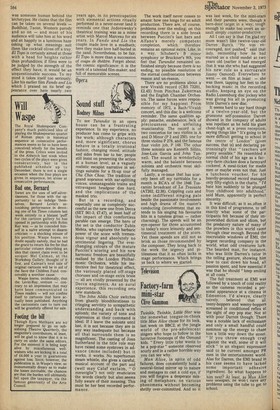Opera
Sound stuff
Rodney Milnes
'To see Turandot in an opera house can be a frustrating experience. In my experience, no producer has come to grips with the work; although characters and, more significant, chorus behave in a totally irrational fashion, changing mood, attitude and sides from bar to bar, people still insist on presenting the action at a human level, as a vaguely realistic escapist narrative in settings suitable for a fit-up tour of Chu Chin Chow. The tradition of grand sopranos with ear-splitting voices, unmanageable trains and extravagant headgear dies hard, and the implications of the masked trio,
But in a recording, and especially one as completely successful as the new one from Decca (SET 561-3, £7.47), at least half of the impact of this comfortless parable can emerge. The hero of the set is the conductor Zubin Mehta, who captures the barbaric power of the score with tremendous vigour and absolutely no sentimental lingering. The everchanging colours of the mature Puccini's scoring and his new harmonic freedom are beautifully realised by the London Philharmonic Orchestra, while his instinctive feel for theatrical effect, the variously placed off-stage choruses and on-stage extra brass — all are vividly presented by the Decca engineers. As an aural experience, this recording sets new standards.
The John Alldis Choir switches from ghastly bloodthirstiness to cringing servility to sympathetic understanding and back with aplomb; the variety of tone and expression at their command is ideal. If I leave the soloists until last, it is not because they are in any way inadequate but because all that surrounds them is so magnificent. The casting of Joan Sutherland in the title role may have raised some eyebrows in advance (mine included) but it works, it works. No superhuman steam whistle, she gives a careful, musical account of the part and (well may Calaf exclaim, " 0 meraviglia") not only enunciates the words clearly but also seems fully aware of their meaning. This must be her best recorded performance.
The work itself never ceases to amaze: how one longs for an adult production. There are, of course, problems over the ending; on this recording there is a side break between Puccini's last bars and Alfano's merely competent completion, which therefore remains an optional extra. Like, in a way, Schubert's B Minor symphony or Bruckner's 9th, you feel that 7'urandot remained unfinished simply because there is no ending, no possible resolution of the eternal confrontation between reason and un-reason.
There are no problems about a new Vivaldi record (CBS 73201, £2.45) from Pinchas Zukerman and the English Chamber Orchestra. The same forces were responsible for my happiest Prom memory of 1972, a Bach/Vivaldi concert, and this disc is a welcome reminder. The same qualities apply: panache, exuberance, lack of preciousness and unfailing musicianship. The record is of two concertos tor two violins in A and D Minor (P 2 and 250), one for three violins P 278, and the famous four violin job, P 148. The other three soloists are Kenneth Sillito, Jose-Luis Garcia and John Tunnell. The sound is wonderfully warm, and the balance between soloists and orchestra most skilfully managed.
Lastly, a re-issue that has scarcely been off my turntable for a month is RCA's of the 1946 Toscanini broadcast of 'La Traviata (AT202, £2.38). Crippling cuts and some indifferent singing pale beside the passionate involvement and high drama of the master's conducting (involvement that ex
tends to his singing his favourite bits in a tuneless groan — rather charming). The speeds will be an eye-opener for those accustomed to today's more leisurely and sen timental treatment of the score.
Yet these speeds are still not as brisk as those recommended by the composer. They bring back to the work the urgency and pitilessness that it so often lacks in stage performance. Which brings us back to where we started.


































 Previous page
Previous page